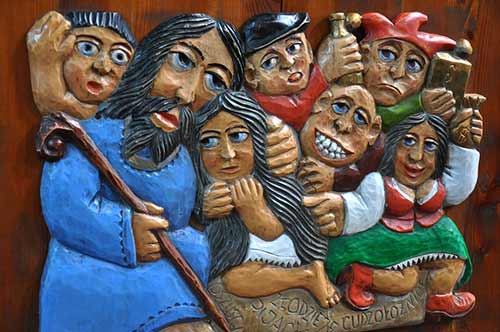
Let us pray (in silence) [that we are drawn closer to God’s goodness]
pause
Look graciously on your whanau [or household],
we implore you, O God, [or Almighty God]
that by your great goodness we may be governed in body
and, through your protection, kept safe in mind and heart;
through our Saviour Jesus Christ,
who is alive with you and the Holy Spirit,
one God now and for ever.
Amen.
The history and commentary for this ancient, shared collect is found here: collect for Lent 5 or below.
The collect highlights that we need the protection only God can provide. In life we are continuously challenged, and merely correctly governing our body does not ensure safety of our soul. That requires God’s preservation. And how are we governed and preserved? Interestingly, not by great judgment, nor by the threat of punishment – but by God’s great goodness. We become better by mercy not by judgment.
This coming Sunday used to be the First Sunday in Passiontide. Since Vatican II it is, more appropriately, simply Lent 5. Passion Sunday is now understood as being the following Sunday, with the reading of the Passion.
This Sunday, Lent 5, has a different gospel reading for Roman Catholics (John 8:1-11) than others using RCL (John 12:1-11)
textweek resources
resourcing preaching downunder
Girardian Reflection on the Lectionary
Commentary on the Collect
This prayer is from the ancient Gregorian Sacramentary:
Quaesumus, omnipotens Deus,
familiam tuam propitius respice:
ut, te largiente, regatur in corpore;
et, te servante, custodiatur in mente…
Cranmer in the 1549 translation has it as:
WE beseche thee, almyghtie God, mercifullye to looke upon thy people; that by thy greate goodnesse they may be governed and preserved evermore, both in body and soule; through Jesus Christe our Lorde.
It was the collect for the Fifth Sunday in Lent from Sarum through the English-language BCPs up to and including 1928. And in the Roman Catholic Church up to and including the 1962 Missal. It has been ignored in both traditions since then.
familiam: refers to more than merely the contemporary nuclear family. It is much more the extended family concept of Maori “whanau”, or “household”. In the ancient thought of the collect, God is the paterfamilias whose lavish bounty to those in the household governs the body and so protects their soul. I am hoping for the principle to come through into a quite different context.
largior: “to give bountifully, to lavish, bestow, dispense, distribute, impart.”
Rego: “to keep straight or from going wrong, to lead straight; to guide, conduct, direct” and thus it is “to guide” in the sense of “to govern” and “to guide into the right way one who has erred; to set right, correct”.
Servo: “to save, deliver, keep unharmed, preserve, protect” and the similar custodio is “to watch, protect, keep, defend, guard”.
mente is translated as “soul” or “mind”. I did not want to encourage too strong a dualism between body and soul, so have rendered it as “mind and heart”.
We need the protection only God can provide. In life we are continuously challenged, and merely correctly governing our body does not ensure safety of our soul. That requires God’s preservation. And how are we governed and preserved? Interestingly, not by great judgment, nor by the threat of punishment – but by God’s great goodness. We become better by mercy not by judgment.
If you appreciated this post, consider liking the liturgy facebook page, using the RSS feed, and/or signing up for a not-very-often email, … If you are on Instagram, please follow @liturgy.
image source: Mary of Bethany and Jesus


